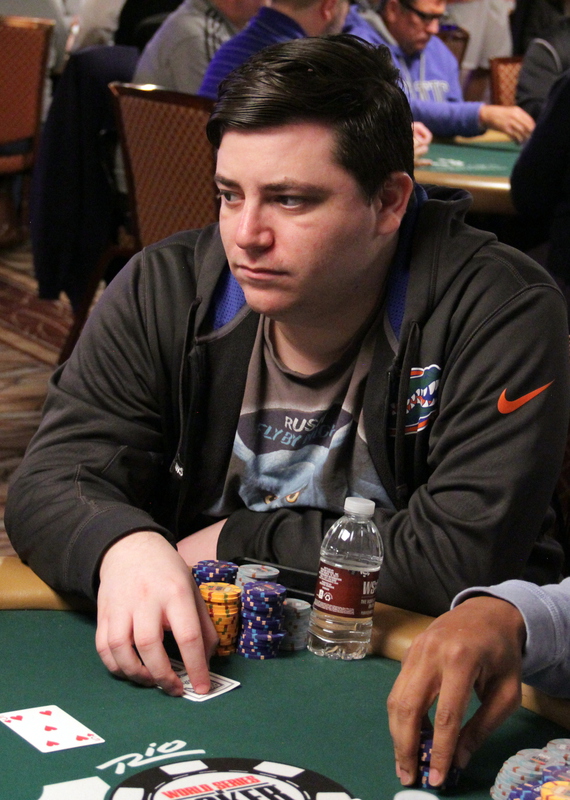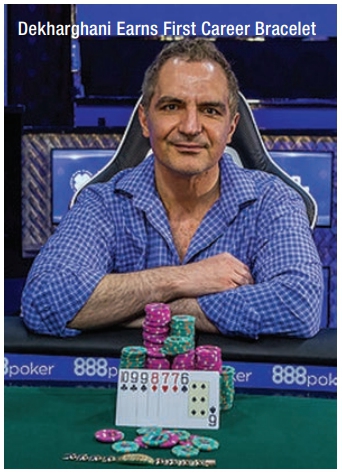






Poker Strategy With Randy Ohel: Razz FundamentalsMixed-Games Specialist Breaks Down Hand From WSOP $10,000 Razz Championship |
|
|

Randy Ohel
The Florida native and Las Vegas resident has more than $2 million in live tournament earnings, almost entirely in mixed events. Ohel has delved into the coaching realm of poker and is currently taking students to learn non-hold’em games. He can be found on Twitter @RandyOhel.
In an effort to provide readers with a solid fundamental strategy of mixed games, Card Player sat down with Ohel to break down a hand from the 2016 WSOP $10,000 razz championship played between five-time WSOP bracelet winner Jason Mercier, bracelet winner and 2010 WSOP main event runner up John Racener, and high-stakes pro Ray Dehkhargani.
The Hand

The Action
Seven-handed at the final table, Jason Mercier completes from early position, John Racener calls from late position and Ray Dehkhargani defends his bring-in. On fourth street, Racener has the lead and bets. Dehkhargani calls and Mercier calls as well.
On fifth, Racener bets again. Dehkhargani calls and Mercier calls. On sixth street, Mercier’s board takes the lead and he bets. Racener raises, Dehkhargani folds and Mercier calls. On the river, Mercier checks and Racener bets. Mercier calls and his 8-7-6-3-A low wins the pot against Racener’s 9-5-4-3-2.
Steve Schult: Let’s start with third street hand selection. We know that Mercier started with either 7-6-A or 9-7-A and Racener called with 9-4-2. I’m assuming this is a standard complete for Mercier if he started with three to a seven, but is this too loose of a call from Racener against an early position complete?
Randy Ohel: It depends on what was behind him and what Jason raised into. Maybe Jason raised into a whole bunch of paint cards. We just don’t know. We also don’t know if there were any deuces and fours out.
If he called and there was an ace and a three out, it would be really bad. But if a deuce and a four folded in between, it’s fine. It just totally depends. Even though Jason is in early position, it could still be a semi-steal if the rest of the table has bricks. It all depends on what else is out.
SS: Ray defends the bring-in. What situations make this play profitable?
RO: The weaker Jason’s hand could be, the more you can call here. If Jason raised into a whole bunch of really good cards, you can’t call with anything really. But if he raised into this four plus a bunch of paint, then you can call with two babies. It would make both of their ranges weaker, especially since Racener didn’t two-bet.
It just depends on what is out there. Ideally, you’d like to have something like a two open from a semi-steal and a two calls, and you have A-2 or A-3 in the hole. You’d like to have duplicated cards (making it harder to pair).
SS: I’d imagine that when you defend the bring-in, that is going to make your hand more face-up. Does that mean you’re going to have to call down a little lighter than normal? Or are you really just going to hope to make a good hand and call?
RO: It really just depends on how both boards break down. Your hand is more face-up in that you almost always have two wheel cards down, so your opponents know that if a six or a seven comes, that’s a good card for you. If a three comes, it might be a really good card or it might be a really bad card.
SS: On fourth street, Racener picks up the betting lead and takes it. Why does Racener bet fourth street here and not check to Mercier?

RO: Well, for one thing, he almost certainly didn’t pair his three, given that Mercier caught one as well. There’s no initiative in that way. The one with the better board is going to tend to have the advantage over the other. You’re not going to just check to Jason because he completed and you called.
It’s totally normal to bet here assuming you haven’t made a pair. Sometimes you’re putting Ray in a difficult position, even if he didn’t pair his ace because it could be three bets by the time it gets back to him. And if he calls that, then he would have wasted a bet.
What could happen is that he’ll bet and Ray will fold knowing that it could be three bets by the time it gets back to him or sometimes Ray will call and it will go raise, raise and he ends up losing the bet. Whereas if Racener checks, trying to check-raise Jason… First of all, Jason will almost always check a pair of threes because you know that you’re almost never up against a pair there. And second of all, now you have to check-raise to get Ray out, and it’s not as good of a situation.
SS: I guess having Ray in between makes things a little different.
RO: Even if you were heads-up, you’d generally be betting, but especially when you have Ray in the middle. If the positions had been different, and it had gone Racener acting and then Jason and then Ray, then you make a better case for checking, because then you could put Ray in the middle on the backside.
You have to check to put him in the middle on the backside instead of the front side. I’ve often said that stud is often a team game. Ray is in a difficult position because if nobody paired, which is likely, then he is likely going to face three bets.
SS: If Racener could beat a seven draw on fourth, wouldn’t he have made it two bets on third?
RO: Not necessarily. Most good players will play their entire range the same way in that situation. The whole game of razz is, did you pair or not? That’s such an important part of what the game is. If you’re telegraphing the sort of hand that you have, you’re making it much easier for the guy to read whether or not you paired.
I love playing against people who two-bet their wheel draws and call their 7 and 8 draws. Those are my favorite people to play against. They are gaining a little bit of value on third street, but they are giving me so much information for later in the hand. And it’s information that I have no right to have. They are just giving it to me.
SS: So after Racener bets and Ray calls, should Mercier be raising fourth street if he has four to a seven low?
RO: Oh yeah. I’m surprised he didn’t. I would expect him to raise and expect Racener to three-bet.
SS: What does Jason’s hand look like at this point?
RO: It looks like he started with a brick or something. It makes it much more likely he started with the nine in the hole and not the seven. There’s more of a case for calling if he has a nine draw, but even so, you’re going to want to raise there a lot. There’s no reason to let the third player see fourth street.
You have a better chance of winning a heads-up pot. You’re sacrificing a little bit of equity on fourth to get a third player out which has a lot of value. And it’s someone that you know has a clean draw because he didn’t fold to the first bet. If Ray paired aces, he would’ve folded to Racener’s bet.
SS: On fifth, Racener has by far the best board. He bets and gets two calls. I assume this street is standard?
RO: Yeah. Unless Ray made a pair of sixes.
SS: Do we assume Ray is drawing to a six at this point?
RO: Yes.
SS: On sixth street, Jason actually takes the lead and bets since Racener paired. Racener raises. Is the raise by Racener just to get Ray out of the hand?
RO: It would depend on what he has. If he has a wheel, then it’s purely for value. It’s not that hard to beat Jason’s possible eight. So, if you’re beating the hand, you want to get value from that hand and you don’t want to let the third player draw. And maybe you’re bluffing if you’ve got two pair or something, although less likely.
SS: Given that we know Racener has a 9-5 low at this point, what is his raise trying to accomplish?
RO: If Mercier made a pair and bet as a bluff, he could win the pot right now and not have to deal with either of the players’ draws. He knows he’s never going to get three-bet and he knows that Ray can’t call two bets cold.
Also, I would say the idea of not having any more pairs and having a better hand is very credible because Racener has all cards between three and five and we know that Ray’s holecards are both between two and five. So Racener shouldn’t have two pair because of the cards that we know Ray has. Ray’s holecards block Racener having another pair.
That’s why I find this bet from Jason very strange. Racener possibly feels the same way and that’s why he’s raising. “How dare you bet here? I’ll raise you!” It’s maybe that sort of thing. Maybe he is turning his hand into a bluff. I don’t know. There’s a decent chance that Mercier was taking a shot at it with a pair or something and will just fold for one more bet.
This whole street is strange, but Racener could be planning on bluffing.
SS: If Racener is raising here as a bluff, he is generally forcing himself into a river bluff as well if he doesn’t improve, right?
RO: Some percentage of the time. Maybe he’ll have some cards that he’ll bluff and some cards that he’ll check.
SS: On the river, does Racener ever really have any showdown value? Or does he have to bet as a bluff?
RO: I don’t think so. I don’t think a nine is ever good. I don’t think Mercier can ever bet-call with an eight-draw. This was a really above the rim hand.
SS: If you don’t think Mercier can bet-call an eight-draw on sixth, what hands can he end up at the river with and then fold?
 RO: If he just thinks that Racener is never bluffing, he’ll fold an 8-7, right? That’s why the bet is very difficult on sixth. Because his hand is face-up and can’t really improve that much. He could improve to a 7-6 and that’s only live when Racener specifically has 8-5 or 8-6.
RO: If he just thinks that Racener is never bluffing, he’ll fold an 8-7, right? That’s why the bet is very difficult on sixth. Because his hand is face-up and can’t really improve that much. He could improve to a 7-6 and that’s only live when Racener specifically has 8-5 or 8-6.
The Outcome
Racener was ultimately eliminated in sixth place, earning $44,712. Mercier and Dekharghani went on to play heads-up for the title. Mercier was gunning for his second title of the series, having won the 2-7 lowball championship a week earlier, and Dekharghani was looking for the first bracelet of his career. In the end, Dekharghani came out on top and earned a $273,338 payday. Mercier settled for the $168,936 runner-up prize, but got some revenge a week after that when he won the H.O.R.S.E. championship. ♠
